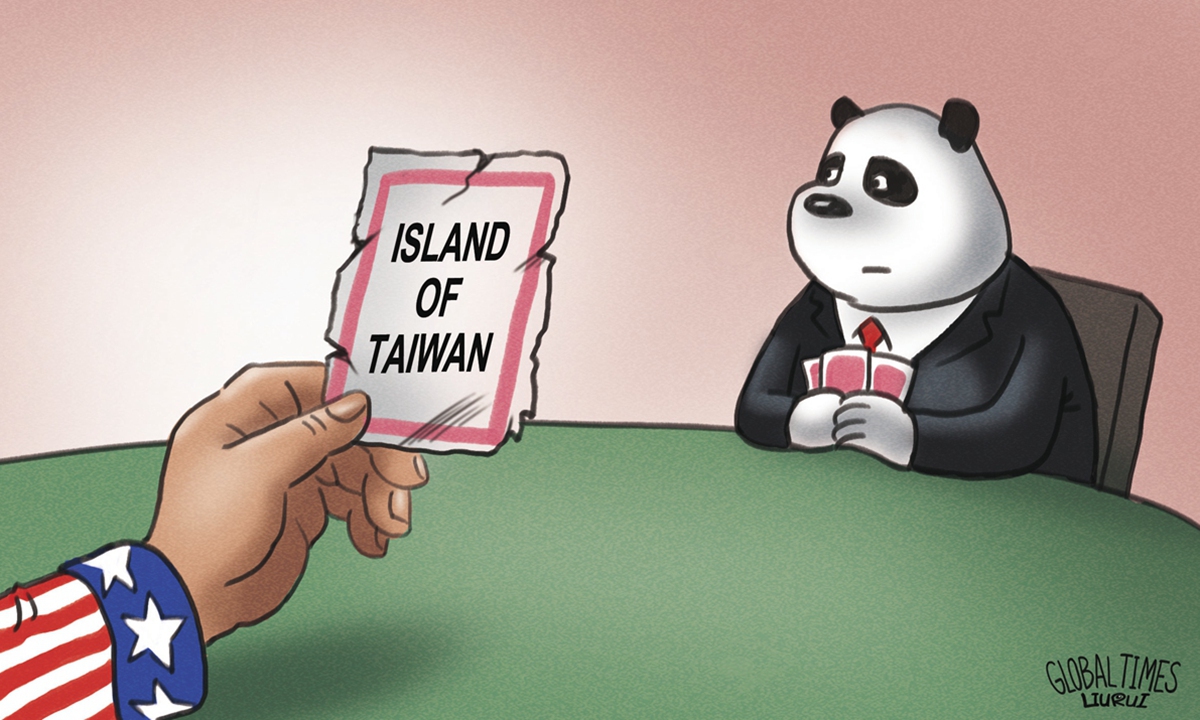
Taiwan island Illustration: Liu Rui/GT
Despite the facts and the legal basis, the Democratic Progressive Party (DPP) authorities in Taiwan island have been distorting the United Nations General Assembly (UNGA) Resolution 2758, openly challenging the internationally recognized one-China principle, and spinning lies to pursue "Taiwan independence." These are extremely dangerous separatist provocations, Mao Ning, a Chinese Foreign Ministry spokesperson, said on Tuesday. The 78th session of the UN General Assembly (UNGA 78) opened on the same day.
The DPP authorities of the Taiwan island claimed on August 29 that "The United Nations continues to misinterpret UN Resolution 2758," even saying that the resolution does not have anything to do with the island.
Tien Chung-kwang, "deputy foreign affairs official" of the Taiwan authorities, has made four requests for the island to participate in the UN, requesting for an improved understanding of UN Resolution 2758 as well as the permission of the island's meaningful participation in the international organization.
In 1971, the UN General Assembly adopted Resolution 2758 with an overwhelming majority, which decided to restore all rights to the People's Republic of China and to recognize the representatives of its government as the "only legitimate representatives of China to the United Nations," and to expel forthwith the representatives of the Taiwan authorities from the place which they unlawfully occupy, Mao noted.
The "dual representation" proposal put forth by the US and a few other countries to keep Taiwan's seat in the UN became a piece of wastepaper, Mao said, highlighting that UNGA Resolution 2758 resolved, politically, legally and procedurally, the issue of the representation of the whole of China, including Taiwan, at the UN. It also made it clear that there can only be one seat representing China at the UN. No issues exist about so-called "two Chinas" or "one China, one Taiwan."
On the basis of the one-China principle, 182 countries have established diplomatic relations with China. The one-China principle has long been a universally recognized norm in international relations and a prevailing consensus among the international community, the spokesperson noted.
Any issue regarding Taiwan region's participation in the activities of international organizations must be addressed under the framework of the one-China principle. Taiwan has no basis, reason or right to join the UN or other international organizations that require statehood, Mao remarked.
The Taiwan authorities have always preferred to make an issue of Resolution 2758 and so-called accession to some international organizations, which do not recognize the island of Taiwan as part of China, and thus use salami slicing tactics to challenge the one-China principle and deny the legitimacy of the People's Republic of China as the sole legitimate government representing the whole of China, Xin Qiang, deputy director of the Center for American Studies at Fudan University, told the Global Times.
The world's understanding of the Taiwan question involving China's red line is far from enough and the topic has been manipulated by the US and some Taiwan independence separatist forces, experts said, adding that the Chinese mainland also needs to gain the moral high ground and voice of international opinion on cross-Straits relations and the interpretation of the one-China principle.
The mainland's policy toward the island has always been two-sided. On the one hand, it insists on ending hostilities through contact, dialogue and consultation on the basis of the one-China principle. On the other hand, the mainland also has the means of thunder and will react harshly to separatist acts that cross the red line, Xin remarked.
The DPP authorities' hype over Taiwan's participation in the UN system is actually an attempt to create a false impression of "two Chinas" or "one China, one Taiwan" and challenge the UN-centered international order underpinned by international law, and they are the ones responsible for disrupting the cross-Strait status quo, Mao stressed.
The Taiwan question is purely China's internal affair and its resolution is a matter for the 1.4 billion Chinese on both sides of the Taiwan Straits, Mao said. UNGA Resolution 2758 must not be challenged and the one-China principle is unshakable, and the complete reunification of China can, without doubt, be realized, she remarked.



